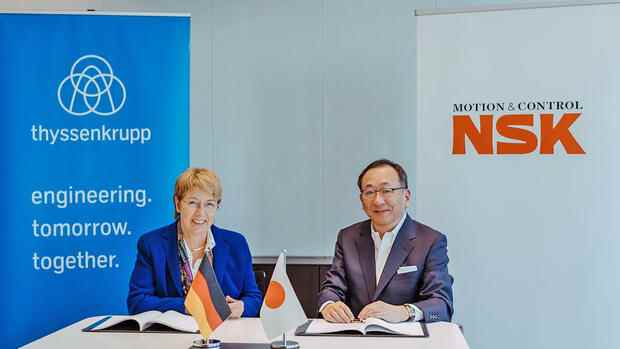In May, ThyssenKrupp CEO Martina Merz and Saimon Nogami, Executive Senior Vice President of NSK, signed a memorandum of understanding.
(Photo: ThyssenKrupp)
Dusseldorf, Frankfurt Discussions about a merger of Thyssen-Krupp’s automotive supply division with the steering business of Japanese competitor NSK are becoming more concrete. As the Handelsblatt learned from informed circles, the Ruhr group is aiming for majority ownership in the planned joint venture. The two companies signed a so-called “Memorandum of Understanding” (MoU) in May to explore prospects for cooperation.
In financial circles, the value of the planned joint venture is estimated at around three billion euros. Thyssen-Krupp did not want to comment on the talks in detail and referred to a statement that the group had made together with NSK when the MoU was announced.
Accordingly, the companies hope for synergies in terms of production competencies, geographic presence and target customers. A decision on the cooperation should be made by the end of the year.
The deal is part of a large-scale corporate restructuring at Thyssen-Krupp. CEO Martina Merz wants to convert the once cumbersome industrial conglomerate into a lean group of companies in which the individual businesses are to be given the greatest possible independence.
Top jobs of the day
Find the best jobs now and
be notified by email.
However, critics complain that there is no overarching plan for the entire group. For example, employee representatives are demanding a clear timetable for the steel division, whose planned independence has been put on hold due to the difficult market environment.
Technology versus sales presence
The automotive supply business, which could now be transferred in whole or in part to a joint venture with NSK, accounted for around 13 percent (around 4.5 billion euros) of sales in the past fiscal year – measured against total Thyssen-Krupp sales of around 34 billion euros . Earnings before taxes, interest, depreciation and amortization (Ebitda) are 451 million euros.
In addition to steering systems, the group’s automotive supply division also develops engine components and body parts.
(Photo: imago images/blickwinkel)
In addition to steering systems, the division also develops engine components and body parts. The production of springs and stabilizers, which has been one of the loss-makers in the group for years, had recently been outsourced by Merz and put to the test.
In industry circles it is said that the Ruhr group expects the deal to give it better access to the Asian market. NSK has built up a strong presence here in recent years, while the group has lagged behind the competition in terms of technology.
Thyssen-Krupp, on the other hand, is considered a technological pioneer with its electric steering systems – but is currently suffering from the weak auto industry, which is being slowed down by the persistent lack of chips and growing concerns about inflation.
In Europe, NSK Steering has locations in Ratingen and Wolfsburg, as well as in France, Italy and Great Britain. The group, which supplies both automobile manufacturers and industrial customers with rolling bearings and steering systems, had around 30,000 employees worldwide and achieved annual sales of almost twelve billion euros in the past financial year.
According to Saimon Nogami, Executive Senior Vice President at NSK, his company shares with Thyssen-Krupp “a very similar culture in terms of performance standards and customer orientation”.
More: “Thyssen-Krupp doesn’t know where it’s headed” – The Ruhr group is struggling for its future
